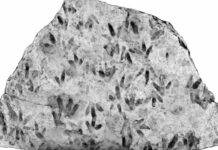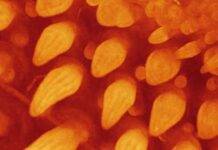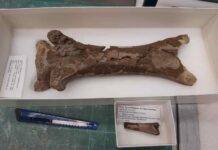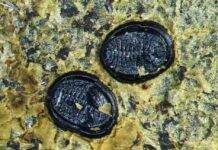
In Cerro Colorado, located in the Ica Desert of Peru, sedimentary sequences dating back nine million years have been found to host the fossil skeletons of hundreds of marine vertebrates. In 2008, remains of a giant raptorial sperm whale, Livyatan melvillei, were discovered at this site. In September 2014, the same international team of researchers, guided by Giovanni Bianucci from Pisa University (Italy), found a partial skeleton of a mysticete whale in a rock boulder.
Besides fossil bones of the skull and mandibles, the rock containing the skeleton showed perfect casts of the whale baleen. The exceptionality of the finding is that the casts provide details at the submillimetric scale, revealing under the microscope the subtle structure of the baleen bristles. Indeed, fossilized baleen bristles have been studied for the first time by chemical and mineralogical analyses. The data obtained allow researchers to compare the Miocene whale feeding habits to those of the extant sea whale, and strengthen the preservation potential of the Ica desert for the marine vertebrate fossil record.
Reference:
Anna Gioncada, Alberto Collareta, Karen Gariboldi, Olivier Lambert, Claudio Di Celma, Elena Bonaccorsi, Mario Urbina, Giovanni Bianucci. Inside baleen: Exceptional microstructure preservation in a late Miocene whale skeleton from Peru. Geology, 2016; G38216.1 DOI: 10.1130/G38216.1
Note: The above post is reprinted from materials provided by Geological Society of America.










